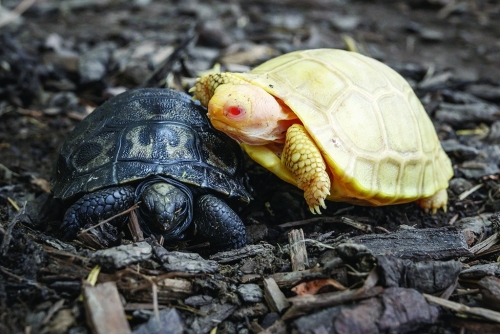Rare albino Galapagos giant tortoise born at Swiss zoo
Agencies | Zurich
The Daily Tribune – www.newsofbahrain.com
In a rare occurrence, an albino Galapagos giant tortoise has been born at a Swiss zoo.
Two tortoises of the Chelonoidis nigra species were born last month at the Tropiquarium zoo in Servion village, according to a Reuters report. As per a statement by the zoo, one of the babies is black like its parents, while the other is white, an albino.
A clip shared by Reuters on YouTube features the two tortoises crawling amid bushes.
Netizens were delighted to see the rare albino tortoise. “Wow it’s beautiful,” an Instagram user commented on ABC‘s post.
The endangered turtles were born as part of a species conservation program. “These are rare and exceptional births, especially for the albino baby. This is the first time in the world that an albino Galapagos tortoise has been born and kept in captivity,” the zoo said in a statement in French.
The phenomenon of albinism is rare in turtles, with the chance of approximately one in 100,000 individuals, compared with approximately one case per 20,000 individuals in humans.
Announcing their birth on Facebook, the zoo officials wrote, “And there you go! Galapagos new giant baby tortoises – Geochelone nigra – have settled into their new home not far from their parents, they are doing well and very energetic. You can come to the Tropiquarium to discover them and observe this new phenomenon of nature, our little giant albino turtle! The third baby is a year older, you will be able to see the size difference between these little guys as they grow to be giants.”
Staff members at the zoo were surprised to see the albino tortoise. “After several months of incubation, we had the chance to see the first hatching, it was the second hatching in the Servion’s Tropiquarium, we already had one last year, this is the second. We were quite surprised by the tortoise’s colour. It can happen at birth, but after two days, we were sure it was an albino when it pointed the tip of its head, so it was really surprising for this species, it’s quite extraordinary,” Thomas Morel, Tropiquarium staff member, told Reuters.
Related Posts

